|
|
|
Sort Order |
|
|
|
Items / Page
|
|
|
|
|
|
|
| Srl | Item |
| 1 |
ID:
170264
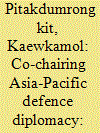

|
|
|
|
|
| Summary/Abstract |
This article assesses co-chairs’ roles in affecting the outcomes of Asia-Pacific defence diplomacy, which have been under-examined. Attempting to mend this intellectual gap, our study examines: ‘What shapes specific agreement details?’ We contend that co-chairs’ effectiveness is not borne out of resource possession but in fact derived from their ability to manage the resources. In order to be effective, co-chairpersons must convert the available resources at hands into bargaining leverage. To validate our argument, empirical analysis of military medicine (MM) collaboration under the ASEAN Defence Ministers’ Meeting Plus (ADMM-Plus) framework was conducted. We demonstrate how the Thai and Russian co-chairs altered the bargaining dynamics to shape the outcomes regarding the ASEAN Center of Military Medicine (ACMM). Insights from our analysis not only extends the existing academic literature on Asia-Pacific defence diplomacy and international negotiation, but also provides practitioners with lessons useful for conducting defence diplomacy and enhancing security cooperation in the Asia-Pacific and beyond.
|
|
|
|
|
|
|
|
|
|
|
|
|
|
|
|
| 2 |
ID:
140278
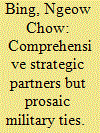

|
|
|
|
|
| Summary/Abstract |
Malaysia and China upgraded their relationship to a Comprehensive Strategic Partnership in 2013 and signed a Joint Communique in 2014. Although the Comprehensive Strategic Partnership includes a pledge to strengthen cooperation between the armed forces of the two countries, so far, however, Sino–Malaysian defence ties have advanced only incrementally. This article focuses on the development of defence relations between the two countries from 1991 until the first half of 2015. It examines several areas of defence diplomacy, including visits by senior officials, the exchange of military students, arms sales, defence and security consultations and combined military exercises. It concludes that although Malaysia–China defence ties have not developed as quickly as other aspects of the bilateral relationship, this does not mean that the Comprehensive Strategic Partnership lacks depth, or that Kuala Lumpur fundamentally distrusts Beijing because of recent developments in the South China Sea.
|
|
|
|
|
|
|
|
|
|
|
|
|
|
|
|
| 3 |
ID:
176004


|
|
|
|
|
| Summary/Abstract |
Defence diplomacy, also known as military diplomacy, is the non-violent use of military forces, adapting public diplomacy, through activities like officer exchanges, combined training programmes, cultural exchanges, and ship visits, etc., to further a country’s diplomatic ties and promoting its international agenda. Despite having existed in various forms for hundreds of years, this custom and its usage as an instrument of statecraft has received surprising little attention as a discipline for scholarly studies. Defence diplomacy in the last few decades have developed as a significant tool in the global political platform for statesmen to create better ties between allies and stand as a formidable opponent.
|
|
|
|
|
|
|
|
|
|
|
|
|
|
|
|
| 4 |
ID:
189639


|
|
|
|
|
| Summary/Abstract |
Defence diplomacy has flourished in the post-World War II global system, but it must be complemented and strengthened with skills in order to achieve complete national power. Joint military exercises are critical for Indian military reform, and the US became interested in jointness after studying the 1990s. Allies are interested in engaging in military diplomacy because of India’s expansion, and India and Japan are partnering to improve cooperation in maritime security and EDR peacekeeping missions. Malabar Exercise 2020, the 24th iteration, was a success, displaying India’s capabilities in testing and bringing together military troops from diverse countries. Military diplomacy is a kind of foreign policy that involves the apparent use of force to achieve a state’s foreign policy objectives, such as naval diplomacy and military visits to other nations. Military diplomacy is an oxymoron since it employs force to further national objectives, while diplomacy is meant to use the tool of dialogue. India is a military force on its way to become a global organisation.
|
|
|
|
|
|
|
|
|
|
|
|
|
|
|
|
| 5 |
ID:
114449
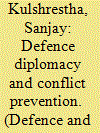

|
|
|
|
|
| Publication |
2012.
|
| Summary/Abstract |
Although the 19
th
century "gunboat" and "parade ground" diplomacy
is of historical interest, a convenient starting point can be 1964, when
the British Secretary of State for Defence, Denis Healey, formulated
the first cohesive defence diplomacy policy. With the withdrawal
from East of Suez, Healey hoped to fill the void and maintain British
influence by a low cost policy playing to perceived British strengths
of military prowess and technological capability. Small training
missions, defence attaches and sales of military hardware were the
three main components of the plan, backed up by occasional military
deployments, high level visits, and the opening up of the domestic
defence establishments to allied military personnel.
1
|
|
|
|
|
|
|
|
|
|
|
|
|
|
|
|
| 6 |
ID:
183383


|
|
|
|
|
| Publication |
s.l., African Sun Media, 2020.
|
| Description |
vii, 289p.pbk
|
| Standard Number |
9781928480549
|
|
|
|
|
|
|
|
|
|
|
|
Copies: C:1/I:0,R:0,Q:0
Circulation
| Accession# | Call# | Current Location | Status | Policy | Location |
| 060133 | 355.033054/LIE 060133 | Main | On Shelf | General | |
|
|
|
|
| 7 |
ID:
143920
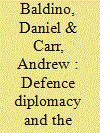

|
|
|
|
|
| Summary/Abstract |
The practice of military-to-military engagement has been strongly embraced in the last few decades as a central tool for strategic management. Many governments in the Asia-Pacific, including Australia, have accepted the practice as an instrument of statecraft to achieve comprehensive strategic outcomes: as a means of defusing tensions, reducing hostility and shaping the behaviour of states towards each other. This article examines Australia's broad approach and practice, and argues that such transformative ambitions are overstated. The evidence suggests that the benefits from defence diplomacy are evident at the tactical and operational level. It is a mode to deal with precise and immediate security issues, as opposed to the moulding of major strategic settings. This indicates the need to better recognise the limitations and conceptual flaws of defence diplomacy, and to reformulate Australian defence channels and related engagement prescriptions towards a more cautious, pragmatic and ultimately security-related stance. Through the use of case-study analysis, this research identifies both opportunities and constraints in conducting defence diplomacy, while offering guidelines for its future implementation in the region.
|
|
|
|
|
|
|
|
|
|
|
|
|
|
|
|
| 8 |
ID:
108093
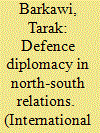

|
|
|
| 9 |
ID:
101721
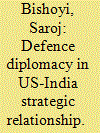

|
|
|
|
|
| Publication |
2011.
|
| Summary/Abstract |
Defence diplomacy helps build trust and confidence between nations and facilitates cooperation at political and economic level. This is evident from the growing US-India strategic relationship. Since the end of the Cold War, the US-India relationship has been evolving and "reaching new heights". In this budding relationship, the most visible manifestation is cooperation in the sphere of defence. It is quite apparent from the increasing frequency and scope of bilateral military exercises, seminars, personnel exchanges, high level and unit visits, officer and unit exchanges, as well as the defence technology sales. During President Barack Obama's visit to India in November 2010, both the countries signed about 20 trade deals worth $10 billion which President Obama believed would not only create fifty thousand jobs in the US but would also advance US-India relations. However, given the huge potential that the Indian defence market holds, the common security challenges that the two countries face and the common values, interests and visions that they share, defence diplomacy can play an important role in further strengthening this burgeoning strategic relationship.
|
|
|
|
|
|
|
|
|
|
|
|
|
|
|
|
| 10 |
ID:
185551
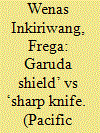

|
|
|
|
|
| Summary/Abstract |
In the Post New Order period, there was a significant development in Indonesia. The issuance of the Law on TNI in 2004, has since guided how the Indonesian military operates in dealing with external and internal security threats and curbed its socio-political role, which is associated with the New Order regime. However, it has not explicitly touched upon the implementation of defence diplomacy, which has significantly increased within the last decade. Hence, the article aims to analyse the development of Indonesia’s Defence Diplomacy in the Post New Order period, particularly in the context of joint exercises. This article attempts to answer two key questions: ‘How has Indonesia developed its defence diplomacy as part of its overall diplomacy?’ and ‘What factors account for different practices undertaken in Indonesia’s defence diplomacy?’ The article qualitatively scrutinises the development of Indonesia’s defence diplomacy activities of joint exercises by comparing two bilateral exercises with the major powers, the Garuda Shield and the Sharp Knife. In supporting the analysis, the article relies on the combination of interviews and observations performed during fieldwork from July 2018 to July 2019. The article is critical since it offers an alternative approach to studying Indonesia’s defence diplomacy.
|
|
|
|
|
|
|
|
|
|
|
|
|
|
|
|
| 11 |
ID:
132282


|
|
|
|
|
| Publication |
2014.
|
| Summary/Abstract |
This article reflects on a decade of British counterinsurgency operations. Questioning the idea that lessons have been learnt, the paper challenges the assumptions that are being used to frame future strategic choice. Suggesting that defence engagement is primarily focused on optimising overseas interventions while avoiding a deeper strategic reassessment about whether the UK should be undertaking these sorts of activities, the article calls for a proper debate on Britain's national security interests.
|
|
|
|
|
|
|
|
|
|
|
|
|
|
|
|
| 12 |
ID:
183379
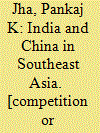

|
|
|
|
|
| Publication |
New Delhi, Manas Publications, 2013.
|
| Description |
342p.hbk
|
| Standard Number |
9788170494539
|
|
|
|
|
|
|
|
|
|
|
|
Copies: C:1/I:0,R:0,Q:0
Circulation
| Accession# | Call# | Current Location | Status | Policy | Location |
| 060129 | 337.59051/JHA 060129 | Main | On Shelf | General | |
|
|
|
|
| 13 |
ID:
182706
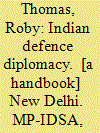

|
|
|
|
|
| Publication |
New Delhi, MP-IDSA, 2021.
|
| Description |
145p.pbk
|
| Series |
MP-IDSA Monograph Series no.; 74
|
| Standard Number |
9788195395705
|
|
|
|
|
|
|
|
|
|
|
|
Copies: C:2/I:0,R:0,Q:0
Circulation
| Accession# | Call# | Current Location | Status | Policy | Location |
| 060108 | 355.0310954/THO 060108 | Main | On Shelf | General | |
| 060109 | 355.0310954/THO 060109 | Main | On Shelf | General | |
|
|
|
|
| 14 |
ID:
157966


|
|
|
|
|
| Publication |
Oxon, Routledge, 2017.
|
| Description |
xi, 137p.hbk
|
| Standard Number |
9781138205253
|
|
|
|
|
|
|
|
|
|
|
|
Copies: C:1/I:0,R:0,Q:0
Circulation
| Accession# | Call# | Current Location | Status | Policy | Location |
| 059335 | 320.91824/DOY 059335 | Main | On Shelf | General | |
|
|
|
|
| 15 |
ID:
101720


|
|
|
|
|
| Publication |
2011.
|
| Summary/Abstract |
With Southeast Asia, India has been enjoying the historical legacy of the strong influence of the Indic civilization and has been strengthening its linkages through strategic engagement, economic liberalization and Free Trade Agreement with the ASEAN countries. After 1992, India formulated its defence diplomacy in consonance with the 'Look East' policy to safeguard its eastern seaboard and secure its strategic interests in the Indian Ocean region. India's defence diplomacy in Southeast Asia aims to accommodate concerns of its neighbours and wants to project its benign role in the region but, of late, the defence diplomacy has China containment strategy also. However, India needs a structured approach in its strategic planning and defence diplomacy while dealing with Southeast Asian countries.
|
|
|
|
|
|
|
|
|
|
|
|
|
|
|
|
| 16 |
ID:
138231
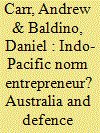

|
|
|
|
|
| Summary/Abstract |
The Indian Ocean is a region of increasing importance, with booming economic opportunities, shifting power dynamics and rising geopolitical competition. To manage this transition some Australian policy-makers are advocating the practice of defence diplomacy as a mechanism to help mould cooperative practices and to build regional trust while dissipating potential or ongoing regional flashpoints. Australia’s 2013 Defence White Paper identified Australia as an agent who can play a critical part in the emergence of certain types of norms as a means of conflict prevention and crisis management in the Indo-Pacific region. This paper explores the use of defence diplomacy as a means for seeking regional influence. It uses an innovative new framework of norm entrepreneurship to examine the choices facing Australian policymakers in increasingly complex security environment. This paper argues that while Australia should aim to promote defence diplomacy as a central part of rising security dialogue and practice with ‘like-mined’ countries, there must also be careful reflection to ensure that this objective is a constructive use of a middle power’s limited resources and influence.
|
|
|
|
|
|
|
|
|
|
|
|
|
|
|
|
| 17 |
ID:
132225
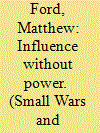

|
|
|
|
|
| Publication |
2014.
|
| Summary/Abstract |
British attitudes towards military intervention following the campaigns in Iraq and Afghanistan have undergone what appears to be considerable change. Parliament has voted against the use of Britain's armed forces in Syria and the public are unenthused by overseas engagement. Conscious of the costs and the challenges posed by the use of British military power the government has been busy revamping the way it approaches crises overseas. The result is a set of policies that apparently heralds a new direction in foreign policy. This new direction is encapsulated in the Building Stability Overseas Strategy (BSOS) and the more recent International Defence Engagement Strategy (IDES). Both BSOS and IDES set out the basis for avoiding major deployments to overseas conflict and instead refocuses effort on defence diplomacy, working with and through overseas governments and partners, early warning, pre-conflict prevention and post-conflict reconstruction. Developing a number of themes that reach from across the Cold War to more contemporary discussions of British strategy, the goal of this special edition is to take into account a number of perspectives that place BSOS and IDES in their historical and strategic context. These papers suggest that using defence diplomacy is and will remain an extremely imprecise lever that needs to be carefully managed if it is to remain a democratically accountable tool of foreign policy.
|
|
|
|
|
|
|
|
|
|
|
|
|
|
|
|
| 18 |
ID:
180264
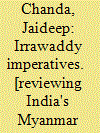

|
|
|
|
|
| Publication |
New Delhi, Pentagon Press, 2021.
|
| Description |
xxxiv, 470p.hbk
|
| Standard Number |
9789390095346
|
|
|
|
|
|
|
|
|
|
|
|
Copies: C:1/I:0,R:0,Q:0
Circulation
| Accession# | Call# | Current Location | Status | Policy | Location |
| 060045 | 327.540591/CHA 060045 | Main | On Shelf | General | |
|
|
|
|
| 19 |
ID:
023266


|
|
|
|
|
| Publication |
2002.
|
| Description |
40-44
|
|
|
|
|
|
|
|
|
|
|
|
|
|
|
|
| 20 |
ID:
182147


|
|
|
|
|
| Summary/Abstract |
Defence Diplomacy is an integral part of foreign policy and state security, it helps in increasing military cooperation between the
countries and strengthening relations between the states. India’s growing global outreach and vibrancy of its foreign policy can be
gauged by the fact that it has made substantial efforts in defence and security cooperation, however, India’s defence diplomacy efforts
do not commensurate to its rising global status, since all tools of defence diplomacy have not been used optimally. In this context, the
paper argues for the need to revisit and formulate a strategy that is aligned with India’s foreign policy. It is because defence diplomacy is vital for a state to not only ensure its stable and strong international position but is also significant in shaping a structured and functional security policy.
|
|
|
|
|
|
|
|
|
|
|
|
|
|
|
|
|
|
|
|
|